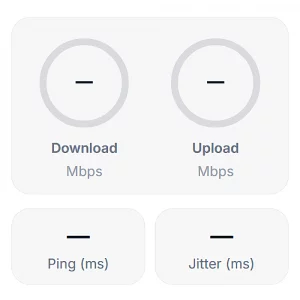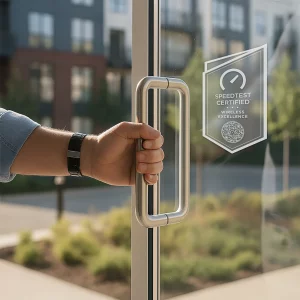- Introduction
- Official ISP Complaint Handlers and Procedures
- Unofficial ISP Complaint Handlers and Legal Counsel
- Common ISP Complaints and Advice
» Difficulties Switching ISP (Migration)
» Tag on the Line (Broadband Ownership Conflict)
» Slamming (Mis-selling)
» Serious Declines in Broadband Speed
» Frequent or Lengthy Broadband Connection Faults
» Billing and Cancellation Errors
» Unreachable Customer Support - Helpful ISP Complaint Tips
- Summary of Useful Consumer Rules and Laws

Broadband is ultimately a variable "Best Efforts" service, which sacrifices guaranteed bandwidth and a low contention ratio in order to be affordable for home consumers and thus the performance will vary (i.e. the network capacity is shared between many local users). But you should not accept a dramatically slower speed than your line is estimated to deliver, especially if the problem occurs throughout the day and no traffic management or fair usage policies are being applied.
Some ISPs will also consider anything below a certain speed to be a line fault that may require investigation, although the internal policies do vary between ISPs and different connection technologies may set different thresholds. For example, slower copper ADSL lines often have a fault threshold of 400Kbps (0.4Mbps) and thus anything below that may be recorded as a fault.
The good news is that Ofcom operates a Voluntary Code of Practice (CoP) for broadband speeds, which all of the major UK internet access providers have joined (reflecting around 95% of UK subscribers) and this contains some useful rules.
Ofcom's 2019 Broadband Speed Code of Practice - Key Rules* Providers must give consumers, at the point of sale, an estimate of the maximum peak time access speed (download and upload) that their line can support; this usually comes in the form of an upper and lower performance range (e.g. "7.5Mbps to 9.2Mbps"), measured in Megabits per second (Mbps). If your speeds fall significantly below this then the ISP must try to resolve the problem. Peak times reflect 8-10pm for residential customers and 12-2pm for businesses.
* Providers must clearly and simply explain how technical factors may slow your speeds, while also offering help and advice to consumers who wish to improve their performance. In addition, the ISP must explain any Fair Usage Policies (FUP), Traffic Management restrictions and or alert consumers when they have been breached.
* Providers must also supply the Minimum Guaranteed Access Line Speed (MGALS) before sale, which reflects the download speed (NOT upload) achieved by the slowest 10% customers on the same package as you (e.g. it will be around 0.8Mbps for ADSL2+ packages, albeit variable between different ISPs).
* There is a key difference for Cable (e.g. Virgin Media) and Full Fibre (FTTP) connections, where speed degradation is not normally affected by the length of your line. For those ISPs the MGALS speed will be at least 50% of the advertised rate of the package instead of 10%.
* Providers will be given 1 month to resolve a problem where the speed falls below the MGALS level and if they fail then the customer must be allowed to exit their contract, penalty free.
It's advisable for anybody who experiences problems like this to run a series of Broadband Speed Tests at different times of the day (keep a timed and dated log of this, including screenshots) to see if you can spot any trends (do this for several days).
It's also worth trying to see if the connection performance varies between different routers (modems), online services and or websites because the problem might not be directly the fault of your connection. Your ISP will find all of this data useful.
Problems with speed can also occur due to physical line problems, especially on copper telephone lines (e.g. ADSL, FTTC), where electrical interference (e.g. Christmas tree lights, faulty AC adaptors and microwave ovens etc.) or an issue with your broadband router / modem may hamper the connectivity (i.e. it might not be the fault of your ISP).
More advanced users should also consider running a Traceroute, which tests the flow of traffic between your connection and another server. Problems can be identified by any servers in the chain that either time-out (fail to respond), run very slowly (400 milliseconds+ is usually quite bad) and or which experience noticeable packet loss.
It's also very important to be aware that most of these rules and situations relate to traditional land based fixed line providers. The same principals do not apply to Mobile Broadband (3G or 4G) services, where dramatic fluctuations in speed are to be expected due to the ever changing environment.
Finally, Ofcom's rule also applies to domestic grade broadband connections for small businesses.
Ofcom's Code of Practice
https://www.ofcom.org.uk/phones-telecoms-and-internet/codes-of-practice








Latest UK ISP News
Helpful ISP Guides and Tips
- FTTP (6929)
- BT (3926)
- Politics (3127)
- Business (2833)
- Openreach (2710)
- Building Digital UK (2541)
- Mobile Broadband (2535)
- Statistics (2166)
- FTTC (2156)
- 4G (2138)
- Virgin Media (2074)
- Ofcom Regulation (1804)
- 5G (1792)
- Fibre Optic (1619)
- Wireless Internet (1615)






























